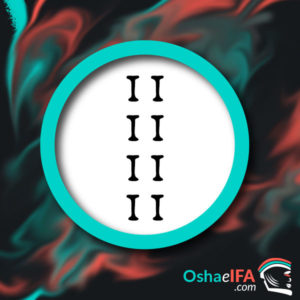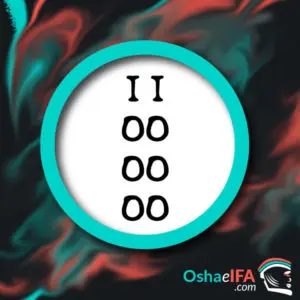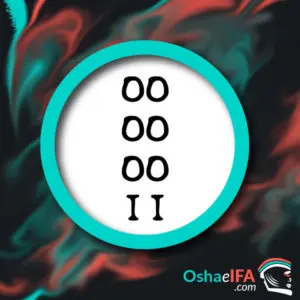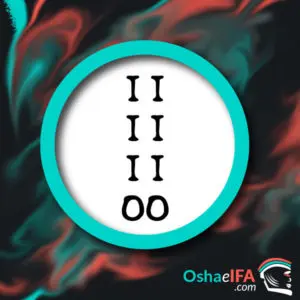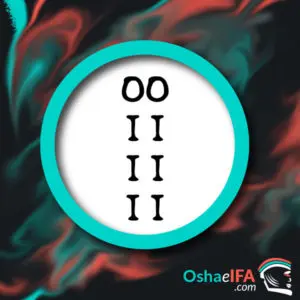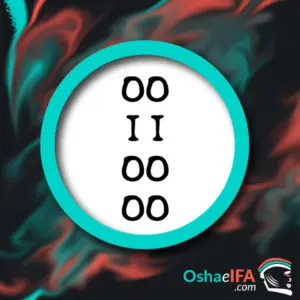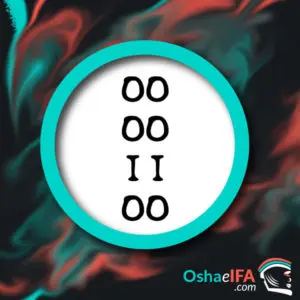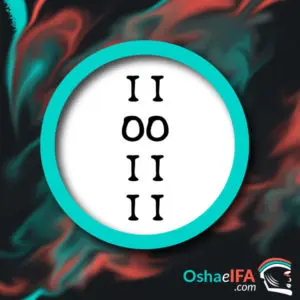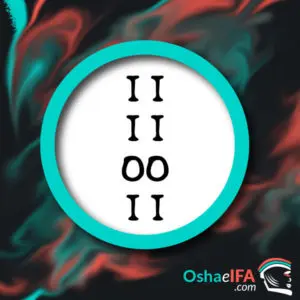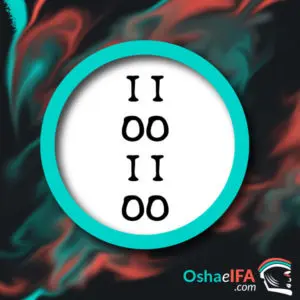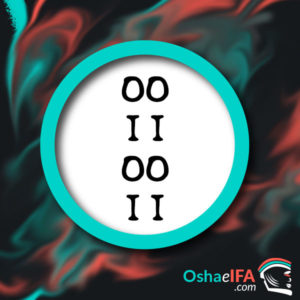Ojuani Meyi: Analysis, Meaning, Sayings and Tips
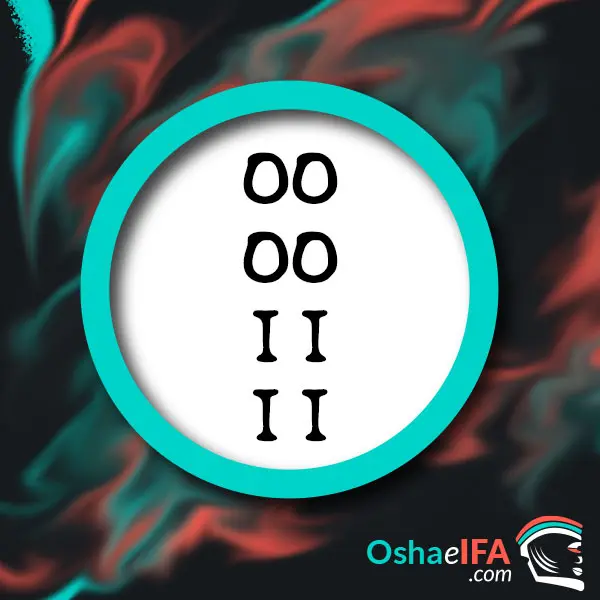
Ojuani Meyi, the sixth Odu in the Ifá hierarchy, is a constant reminder of the duality of life, where blessings and adversities coexist, guiding his followers towards making appropriate sacrifices and seeking clear thinking. Ifá says that the person to whom this Odu is revealed will be able to overcome the bad actions imposed by his enemies.
Overview of the Odu of Ifa Ojuani Meyi (Owonrin Meji)
The Odu Ojuani Meyi, known as the Ifá of the Mirror, stands out for its ability to reflect the intrinsic duality of existence and the interaction between spiritual and material forces. This sign, fundamental in the practice of Ifá, reveals the dynamics of conflict and harmony, offering guidance for balance through sacrifices and conscious actions. Its meaning and the implications of its births are explored, unraveling how it influences the lives of practitioners and their environment.
What is born in the odu of Ifá Ojuani Meyi?
- The Arayese (enemies).
- The celebrity and the conquests.
- Belief, spiritual possession.
- The deformed beings in the astral field.
- The hands and feet.
- The chicken in the shade and the Paraldo.
- The ceremony of the JA of Osono, which the Arará call the brush of Sankpana (Saint Lazarus).
- Take a mamey seed with the Odu to sacrifice Egun and tear off the animal's head.
- Diplomacy.
What does the Ojuani Meyi sign talk about?
- Omilaba, the power of Oshun, who is the directing head of the Egun cult and transforms into water.
- The foundation of the towns.
- The talent of healings.
- The revelation.
- The kestrel.
- The pointed snails.
- That the godfather and the oyubona cannot whip the godson in the Iyoyé, nor in the Kakuanaldo ceremony.
- The forgetfulness of the lives before being born.
- It talks about life and death.
- Eshu and Shango eat together.
- The earth's crust unfolded and rocks formed.
- The Odu-Ara goes to the sacrifice.
- The chameleon speaks (Alaguema).
- They made Ifa to the cat.
The sign Ojuani Meyi points out:
- Ashikuelu and Orun, and the genius of the earth.
- The territorial conquests.
- Ulcers of the rectum, duodenum and stomach, and malignant tumors. The absorbent philosophy of the intestine.
- That to feed the earth you have to call the nine spirits of the earth.
Analysis and Reflection of the Ifa sign Ojuani Meyi (Owonrin Meji)
Odu Ojuani Meyi stands out in Yoruba cosmology for his profound teachings on the duality of existence and the balance necessary to navigate life. This Odu warns of the presence of Arayes (enemies) and the trials that may arise, but also promises the possibility of achieving celebrity, conquests, and a deeper understanding of belief and spiritual possession. The wealth of knowledge that emerges from Ojuani Meyi ranges from the economic to the spiritual, including health and personal relationships.
Economic Aspects:
Economically, Ojuani Meji promises prosperity to those who follow the path of right sacrifice and diligent work, especially in the field of agriculture. This Odu teaches that wealth is not an effortless gift, but the result of patience, hard work, and faith in the divine process. The blessings of Ojuani Meyi in finance require a commitment to ethical practices, respect for the land that sustains us, and the clear understanding that each harvest is also a sacrifice to the cosmic order, an eternal cycle of giving and receiving.
Health:
Ojuani Meyi highlights health as a reflection of inner balance and respect for taboos and spiritual prescriptions. The illnesses mentioned in this Odu, particularly those related to the stomach and digestive system, symbolize deeper imbalances and the need for alignment with natural and spiritual laws. Careful attention to diet, prescribed sacrifices, and spiritual cleansing are essential to keeping body and soul in harmony, remembering that our physical well-being is inseparable from our spiritual health.
Religious Aspects:
Religiously, Ojuani Meji emphasizes the critical importance of sacrifice, ancestor veneration, and constant consultation with the Orishas. This Odu teaches us that spiritual clarity and success in our endeavors are directly proportional to our willingness to listen and act according to ancestral and divine wisdom. This sign is a call to deepen our spiritual connection through religious practice, reinforcing the idea that the guidance and protection of the Orishas are obtained through respect, offering and obedience to the dictates of heaven.
Personal relationships:
In the area of love and personal relationships, Ojuani Meyi advises caution, fidelity and the avoidance of unnecessary conflicts. This Odu highlights the importance of mutual understanding and respect as the foundation of any lasting relationship. He warns us against jealousy and arguments that can arise from misunderstandings or lack of communication, suggesting that true love requires patience, commitment, and the ability to see beyond our own needs and impulses. At its core, Owonrin Meji guides us toward deeper, more meaningful relationships, built on a foundation of trust, respect, and genuine love.
Ojuani Meyi teaches us about the complexity of life and the need to face our challenges with courage and wisdom. He reminds us that behind every adversity lies an opportunity for spiritual growth and personal transformation. Through the observance of sacrifices, respect for nature and our ancestors, and the search for balance in our relationships, we can aspire to a full and harmonious life. This Odu is a call to live consciously, recognizing the interdependence of all aspects of our existence.
It may interest you: Oddun of Ifa Ojuani Shobe
Recommendations of the Ojuani Meji sign:
- Prioritize Prescribed Sacrifices: It is essential to make offerings and sacrifices to both the Orishas and the ancestors. This practice ensures a protective covering and attracts blessings of prosperity and companionship vital for personal development and well-being.
- Promote Mental Clarity: Concentration and clarity of thought are essential to achieve success. Dedicate yourself to cultivating a focused mind, free of distractions, to move purposefully toward your goals.
- Promote Agricultural Activity: Connection to the land through agriculture is a valuable source of economic and spiritual rewards. Get directly involved in cultivating and caring for the land to encourage abundance and self-sufficiency.
- Honor Elders and Ancestors: Respect for elders and veneration of ancestors constitute essential pillars for an enriched and protected life. These practices strengthen ties to the past and ensure the spiritual guidance and support needed for the present and future.
- Promote the Peaceful Resolution of Conflicts: In the face of adversity, always opt for peaceful solutions. Avoiding conflicts and seeking harmony contributes to an environment of tranquility and well-being, both personal and community.
- Be Aware of Relationships and Environment: The quality of personal interactions and the environment that surrounds us directly influence our well-being. It is vital to maintain healthy relationships and be selective with the environments in which we operate to promote positive comprehensive development.
- Consult Ifá in Crucial Moments: Ifá wisdom is an invaluable tool in making important decisions. Regularly consulting Ifá allows you to obtain divine guidance and take courses of action aligned with personal destiny and collective well-being.
With the Odu "Ojuani Meyi", the importance of sacrifice and communication with the spiritual is highlighted to achieve material and spiritual achievements. This sign, by teaching us the intrinsic value of sacrifice, not only advocates the connection with the Orishas and ancestors, but also emphasizes the need for clear thinking, the appreciation of the roots and the constant search for balance and harmony in each aspect of life.
What are the prohibitions of Ojuani Meji?
- Moderation in Water Consumption: It is crucial to limit water intake to prevent adverse effects on your well-being, according to the teachings of this Odu.
- Restriction on the Consumption of Viscera: It is strongly recommended to avoid animal viscera to avoid health complications.
- Distancing Conflicts and Conspiracies: It is imperative to stay away from any situation that could plunge you into discord or machinations, thus protecting your peace of mind.
- Absolute Respect for the Family: Abuse towards mothers or wives is unacceptable; Harmful actions always find their way back to their origin.
- Consistency in Decisions: Maintain a determined stance and avoid wavering, especially on specific missions or purposes, reflecting the seriousness of your commitment.
- Diligence in Rituals and Offerings: Skipping rituals and spiritual offerings can trigger negative effects; Its compliance is essential for balance and protection.
- Avoid Commercial Ventures: Starting businesses without proper preparation or at inopportune times could lead to failure. Listen to Ifá's advice and act with caution.
- Focus on the Domestic Area: Dedicate your primary attention to resolving difficulties within your home, avoiding distractions from external problems.
- Ban on Cursing: Words have power, and cursing can bring real consequences and regret; Choose your words wisely.
- Control in the Consumption of Alcohol and Seasoned Foods: Moderation in alcohol and spicy foods is crucial to avoid digestive disorders and maintain stomach health.
These prohibitions, based on the principles of Ojuani Meyi, not only seek to avoid misfortune, but also to promote a life full of balance and spiritual harmony.
Sayings of the Odu of Ifa Ojuani Meyi:
- A simple hook in wood cannot lift a package.
- War does not break the rock.
- Clear thinking is required to achieve success.
- Without Olodumare's order, war will not come to the world.
- The eyes see that the fire cooks, but they do not see it eat.
- The goat capable of uprooting wood cannot withstand one made of iron.
- Gratitude is the heart's memory.
- To do justice to one is to threaten all.
- The evil you wish on another will be reflected on yourself.
- Whoever does not give respect will reap grievances.
- The soap that cleans the body always wears out.
- I have seen death with a club in its hand.
- Whoever hits his mother will surely do it to his wife and children.
- Whoever brings evil to others has learned it at home.
- No matter how long the path is, the shadow of your silhouette will follow you.
- You don't put an ordinary mat on top of a quality one.
- A doctor can cure others but not himself.
"The evil you wish upon another will be reflected upon yourself" is a powerful reminder of the universal law of cause and effect, known in some traditions as karma. This saying teaches that the negative intentions and actions we direct toward others not only harm the person targeted, but inevitably return to ourselves, often with greater intensity. It is a warning to cultivate positive thoughts, words and actions, understanding that the well-being of others and our own are intrinsically connected.
Ifa ethical code of odu Ojuani Meji:
- Neither the Olúo nor Oyugbona will whip the godson.
It may interest you: All about the sign of ifa Iwori Meyi
Meaning of the Sign of Ifa Ojuani Meyi
The Odu of Ifá Ojuani Meyi stands out for its profound power and meaning within Yoruba cosmology. Embodying the essence of Olofin's mandate, Ojuani Meyi not only gave life to the colors and precious stones of the world, but also became a channel through which the eternal cycles of life and death are explored. The presence of this Odu in an Ifá consultation is a call to deep reflection, indicating the need to make sacrifices and adhere to ancestral wisdom to live a full and balanced life.
This Odu is associated with bright and variegated colors, symbolizing the wealth of experiences and knowledge it offers. Belief and revelation are fundamental in Ojuani Meji, whose auspicious day is Thursday and is ruled by the planet Neptune, with tin as a significant metal. Navy blue, as the recommended color of clothing, reflects the depth and serenity sought when following this path.
For women who wish to conceive, Ojuani Meyi advises specific sacrifices that include a dog and a rooster for Ogun, as well as a goat for Eshu, emphasizing the importance of intention and ritual action in the materialization of their desires. When this Odu appears in divination, especially for the young, she points out the importance of making appropriate sacrifices to ensure a long and need-free life.
Treaty of the Odu Ojuani Meji
The followers of Ojuani Meyi are urged to seek their own Ifá and consult the Orishas sincerely and from the heart. The warning here is clear: without authentic spiritual guidance, one can easily get lost in the hidden labyrinths of existence. This Odu, representing the underworld and the complexities of life and death, invites his followers to a deeper understanding of the universe and themselves, through the practice of sacrifice and respect for the ancestors and the Orishas. .
Ojuani Meyi is an Odu of strength, giving his followers the ability to heal and overcome obstacles, marking the birth of famous figures and significant achievements. As individuals move away from spiritual nomadism to found their own inner “villages,” they are reminded of the importance of toughness, healing, and the pursuit of celebrity and conquest in their own lives, always guided by Ifa wisdom.
For those seeking to delve deeper into the wisdom of Odu Ojuani Meyi, it is crucial to understand “The role of Eleguá in the Yoruba religion«, as the guardian and facilitator of communication with the Orishas.
Ifá says in Ojuani Meyi:
You are warned that before embarking on a journey to a certain destination, it is crucial to make sacrifices. This is due to the presence of an extremely powerful araye (enemy) that prevents you from progressing. This adversary will be in the same place you want to go.
In your home, there is someone who is negatively affecting your health, especially your stomach, or it could be you who is self-inflicted. Additionally, it is pointed out that a close friend is practicing witchcraft against you. Unfortunately, you fail to see the fruit of your efforts due to the ingratitude of the people around you, who seem to work harder against you than they do for your benefit.
It is strictly prohibited for you to consume organ meats or grains of any kind. You should also refrain from cursing others. It is essential that you pay attention to the health of your kidneys, heart, stomach, circulation and avoid any form of poisoning. It is recommended that you moderate your alcohol consumption and avoid drinking large amounts of water.
You should exercise caution when passing by young people playing ball or other games, as there is a risk of being accidentally hit.
If you practice spiritualism, you are identified as a possession medium. You have a relative who, it is said, had hidden money and died due to heart problems.
Prayer of the Odu Baba Ojuani Meji:
OJUANI MEYI ADIFAFUN AGANGARA ADELEPEKO KIKOMADA AIKU ADELEPEKO KOMO
OLORDUMARE AGANGARA OLUWO NI ORIBI OKUN ORUN WA LE ESHU. KIKOMAKUADA IKU,
KIKOMAKUADA ARUN, KIKOMAKUADA OFO, KIKOMAKUADA EYO, KIKOMAKUADA ARAYE,
KIKOMAKUADA OGU, KIKOMAKUADA ONILU.
Suyere Ojuani Meji:
AYAGANGARA OMO LORDUMARE, AYAGANGARA OMO LORDUMARE
AIKU LOWAO OMO LORDUMARE, AYAGANGARA OMO LORDUMARE.
Eboses of Odu Ojuani Meyi in Ifá:
Ebbo of Ojuani Meyi to perform witchcraft on a person:
For this ebbo, you need a large dilogun snail. Before washing his mouth in the morning, the person concerned must scrape his tongue with a trowel and place the scraped material inside the snail, while reciting Ojuani Meji and cursing the person in question. Then, the head of a live aguema (lizard) is inserted into the snail. The snail is then ground into a fine powder that will be blown onto the target person.
Work of Ojuani Meyi 11-11 against enemies:
To ward off enemies, a chicken is sacrificed to Eshu (Elegua), then it is wrapped in banana leaves along with 21 ataré (guinea pepper), everything is burned to ashes, and this dust is blown towards the enemies to get them away. To combat the disease, a head prayer (Kobo-Ori) will be performed with two white doves, which will later be released into the river.
Patakies of the Ifa sign Ojuani Meyi:
The pepper became spicy
At a time when Pepper and Millo coexisted in harmony, both shared the desire to stand out and not be easily defeated by their adversaries. This ambition, however, sowed the seeds of suspicion among them.
La Pimienta, seeking to overcome the Millo, consulted Orunmila, who revealed to her through the Osode Ojuani Meyi that she should perform an Ebo. This ritual included visiting Eshu and stealing a red guirito, whose lid symbolized strength and itching, and rubbing it all over his being. Following the instructions meticulously, Pimienta executed the Ebo, delivering grains and other essential ingredients to Eshu. By stealing the red guirito and applying it to herself, Pepper transformed into a robust and spicy plant.
Millo, driven by a similar desire, also went to Orunmila, receiving the same instructions. However, his failure to include grains in his offering prevented him from stealing the guirito, forcing him to confess his intention to Eshu. Seeing that there were only two guiritos left, he chose to give Millo the white guirito. When rubbed, Millo turned into a spikey plant.
A man, entering the mountain, first discovered the Millo, whose grains he fed his chickens and, after grinding it and tasting it, he found it delicious. Upon returning, he found the Pepper, but when he mixed his grains with those of the Millo, he noticed the intense sting of the Pepper, concluding that its strength was incomparable to that of the Millo.
Explanation: This story teaches us about the consequences of ambition and competition. While Pepper sought to stand out through cunning and sacrifice, Millo failed in his attempt by not following instructions to the letter. The narrative highlights the importance of dedication and effort in pursuing our goals, as well as accepting our own strengths and limitations. The Pepper became strong and spicy, standing out for its uniqueness, while the Mille, although less potent, found its value in its flavor and usefulness. The story emphasizes that each being has its own path and intrinsic value, and that the desire to surpass others should not lead us to despise our own virtues or those of others.
The Chameleon and the Dog
At the dawn of the world, the Chameleon was of a single color and lacked any adornment, which led him to envy the Dog, who seemed to change color and wear different collars every day. Consumed by envy, the Chameleon looked for a way to surpass the Dog in beauty and color.
He consulted Orunmila, who, after performing a Osode, warned the Chameleon about the dangers of envy and the desire to do harm to others, emphasizing that those who seek evil from others end up seeing it fall on themselves. However, the Chameleon insisted, and Orunmila, giving in to his persistence, made a prayer that granted him the ability to change color and produce necklaces from his neck. Despite this, the Chameleon could not surpass the beauty of the Dog.
Still dissatisfied and dominated by envy, the Chameleon returned to Orunmila, who, although reluctant, agreed to prepare some magic powder for him on the condition that the Chameleon not look at anyone until using them. Forgetting this advice, upon arriving home and seeing her mother, he killed her with her gaze, remaining cursed ever since.
Moral: This story illustrates the profound consequences of envy and malicious desire toward others. Envy, far from leading to personal improvement, immerses the envious person in perpetual bitterness and can lead to irreparable consequences, as in the case of the Chameleon who, in his desire to surpass the Dog, ended up causing the death of his own mother. This story reminds us of the importance of valuing what we are and have, without falling into destructive comparisons or desires to improve at the expense of others' well-being. True improvement is found in personal growth and the ability to sincerely rejoice in the achievements of others, thus avoiding the bitter poison of envy.
Ojuani Meyi - Owonrin Meji Ifa Traditional Nigerian.
ÒWÓNRÍN MÉJÌ
Akarasangba Òsùmàrè
Òsùmàrè náà Akarasangba
A dífá fun Ìrókò Ògò
Níjó tí ń be láàrin Òtá Sáńgílítí
"Ààrin Òtá tí òún wà yí?"
"Un le ségun báyìí?"
Wón ní kó rbo
Ó bá rbo
Ló bá ga ju gbogbo pàňtí igbó
Ló bá te gbogbo àwon òtá è mólè
N ní wá ń jó n ní ń yò
Níń yin àwon Babaláwo
Àwon Babaláwo ń yin Ifá
Ó ní béè làwon Babaláwo tòún wí
Akarasangba Òsùmàrè
Òsùmàrè náà Akarasangba
A dífá fun Ìrókò Ògò
Níjó tí ń be láàrin Òtá Sáńgílítí
Ebo n won ni or se
Ó wáá gbébo ńbè
Ó rubo
Ìrókò Ògò nìkàn ló yori jú wón lo
Ìrókò Ògò.
Ifá says that this person overcome the bad actions imposed by his enemies.
Akarasangba Òsùmàrè
Òsùmàrè náà Akarasangba
They prophesied Ifá for Ògò
The day he was in the midst of his real enemies
He asked "Am I living in the midst of enemies?"
"Will I be able to overcome them?"
They advised him to make sacrifice
He offered the sacrifice
He grew above all the vines and grasses of the forest
And reached all of his enemies
He began to dance and rejoice
He praised his Babaláwos
Their Babaláwos praised Ifá
He said it was exactly as his Babaláwos had said
Akarasangba Òsùmàrè
Òsùmàrè náà Akarasangba
They prophesied Ifá for Ògò
The day he was in the midst of his real enemies
Sacrifice was the prescribed solution for him
He heard about the sacrifice
And he did
Ìrókò Ògò only you could surpass them all
Ìrókò Ògò.
Eshu of Odu Ojuani Meyi: Eshu Ashikuelu
Eshu Ashikuelu is recognized as the genius of the earth and the owner of all minerals, invoked through the deity Oro. He resides with Odu Bole and stands out as the leader of the Egun, living outside the home.
Eshu Ashikelu Charge: Includes a four-cornered stone, knight's stick, path breaker, moruro, grass and get up herbs, a washed Ofo ikin, bull's blood, Osanyin charcoal, pica pica, twenty-one links of chain, crab earth, earth collected in front of a prison, from the center of the mountain, tiger bone, owl head, tiñosa, ivory, a variety of minerals, jutía head, ero, obi, kolá, osun naború, different types of sand, four bibijaguas, brandy, butter corojo, cascarilla, jutía and smoked fish, dog head bone, child's head, seven Obatala beads, seven black beads and Orunmila beads.
Distinctive aspects: Eshu Ashikuelu is characterized by carrying a staff called Ashiakuabu, made of Iroko wood. The handle of the staff, hollow, contains scratches from a lion's fang and dog, dust from a dog's head and majá, cemetery soil, erú, obi, kolá, osun naború, aira, anun, obi motiwao, and powder from herbs and sticks. specific as opens the way, removes curse, stings stings; In addition to rooster egg, win battle, cuichinango.
Rituals and offerings: A black dove is offered to this staff every time Eshu Ashikuelu receives offerings. At the beginning of the year, a small black goat is sacrificed, which is divided into four parts and accompanied by a lit candle. This Eshu is spiritual in nature and is acclaimed for having created the world and ending the flood.
